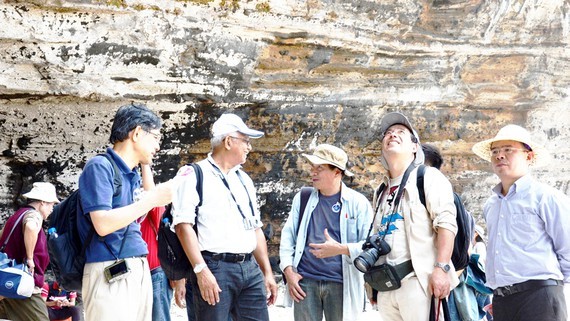
The construction project of Ly Son – Sa Huynh Global Geopark (Geopark Project) began in 2015. After 5 years, it used VND22 billion (approx. US$955,000). Chairman of Quang Ngai Province People’s Committee Dang Van Minh shared that the project covers a surface area of 4,600km2, which does not observe the Resolution of the 19th Provincial Party Congress. This land use has not received a consensus approval from the localities.
Chairman Minh expressed his determination to cease this Geopark Project, but the final decision must wait for the approval of the Standing Committee for Quang Ngai Province Party Committee.
Dr. Tran Van Nam from the Vietnam Institute of Geosciences and Mineral Resources – Ministry of Natural Resources & Environment, voiced his regret, not only for the 6 years he spent on promoting this project but also for its 90-percent complete status for UNESCO to certify this global geopark in Vietnam.
In his opinion, the benefits gained from this decision cannot at all make up for the losses. First of all, there will be no more strongest foundation, mechanism, and policy for a sustainable development of natural and geological heritages in Ly Son District when facing the fierce urbanization process.
Secondly, a certified global geopark does promote the image of that location to people nationwide and worldwide effectively, like the case of Dong Van Karst Plateau Geopark in the northern province of Ha Giang. In only 9 years after being certified, that park welcomed an increasing quantity of tourists from 300,000 in 2010 to 2 million in 2019.
Head of the Vietnam Institute of Geosciences and Mineral Resources Tran Van Tan added that it would be such a waste of money and effort of many scientists and state officers to discontinue the construction project at the moment, not to mention the neglect of the public’s view.
In addition, this cease after necessary documents have been submitted to UNESCO would create an undesirable image of Vietnam to the international community and UNESCO itself, which might negatively affect the approval to registration for other global heritages, world biosphere reserves, and global geopark in the nation.
Dr. Tran Van Tan further explained that the concern of Quang Ngai Province’s authorities over complexities in frequently asking for UNESCO’s permission regarding this geopark is rather unreasonable. Unlike world heritages or world biosphere reserves, which normally require strict protection, a geopark has much more space for socio-economic development like mineral exploitation areas, resorts, industrial parks.
Dr. Guy Martini, General Secretary of UNESCO’s World Network of Geoparks said that he could not predict the international effects of this cease. He and his fellow-scientists find this intention incomprehensible. Many countries in the world hope to have even one global geopark inside their nation, but now Quang Ngai Province wants to stop this valuable project. This would mean thousands of working hours of the local authorities, international councils, scientists, and indigenous residents become a complete waste.
Since Vietnam for many years has tried to boost its image and status among the international community via the fulfillment of its duties and the efforts to protect the environment, to fight against climate change, and to promote sustainable economic strategies, such an intention of discontinuing the Geopark Project is not at all recommended.
Dr. Guy Martini hoped that Quang Ngai Province could hold a cooperative discussion between the local government, the Management Board of UNESCO’s Geoparks and domestic scientists to clear up any possible misunderstanding and reach a more sensible decision so that Ly Son – Sa Huynh Global Geopark becomes the fourth UNESCO’s geopark in Vietnam.
























